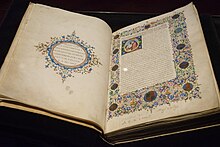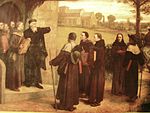Lorenzo Valla

Lorenzo Valla (Italian:
Life
Valla was born in
Bruni was a papal secretary; Melchior Scrivani, Valla's uncle, was another. But Valla had caused offence, to Antonio Loschi, by championing the rhetorician Quintilian in an early work.[7] In 1431, he was ordained as a priest; the same year Valla tried in vain to secure a position as apostolic secretary[5] to China.[8] He was unsuccessful, despite his network of contacts.[7]
Valla went to Piacenza, and then to Pavia, where he obtained a professorship of eloquence. His tenure at Pavia was made uncomfortable by his attack on the Latin style of the jurist Bartolus de Saxoferrato. He became itinerant, moving from one university to another, accepting short engagements and lecturing in many cities.[5]
Invited to Rome by Pope Nicholas V in 1447, Valla worked there on his Repastinatio.[9] He became a papal scribe and, in 1455, a papal secretary.[7]
Valla died in Rome. He was originally buried beneath the monumental bronze
Reputation
Older biographies of Valla give details of many literary and theological disputes, the most prominent one with
Works
On the Donation of Constantine
Between 1439 and 1440 Valla wrote the essay, De falso credita et ementita Constantini Donatione declamatio, which analyzed the document usually known as the
From 1435 to 1445, Valla was employed in the court of Alfonso V of Aragon, who became involved in a territorial conflict with the Papal States, then under Pope Eugene IV.[11] This relationship possibly motivated his work; in any case, he was put on trial before the Catholic Inquisition in 1444, but was protected from imprisonment by the intervention of Alfonso V.[1]
Valla demonstrated that the internal evidence in the Donation told against a 4th-century origin: its vernacular style could be dated to the 8th century. Valla argued this thesis in three ways:
- By stating that the Emperor Constantine could not have legally given Pope Sylvester the powers that the Donation claimed.
- From the absence of contemporary evidence, Valla reasoned that it was implausible that a major change in the administration of the Western Roman Empire had taken place.
- Valla doubted that Emperor Constantine had given Pope Sylvester anything at all, suggesting a mistake involving an earlier Pope.
Supplementing these points, Valla argued from anachronism: the document contained the word satrap, which he believed Romans such as Constantine I would not have used.[12] In addition, Valla believes that the quality of Latin for such a supposedly important text was undeniably poor, evidencing this by the fact that the text constantly switched tenses from "we have proclaimed" to "we decree", for instance.
Textual criticism

A specialist in Latin translation, Valla made numerous suggestions for improving on
In his critical study of the official Bible used by the Roman Catholic Church,
Manuscript works
Valla made a contemporary reputation with two works: his dialogue De Voluptate and his treatise De Elegantiis Latinae Linguae. Richard Claverhouse Jebb said that his De Elegantiis "marked the highest level that had yet been reached in the critical study of Latin."[5][5]
| Initial date | Initial title | Scope | Versions, comments |
|---|---|---|---|
| 1431 | De Voluptate | "On Pleasure". | Version of 1433 as De vero bono (On the true good).[7] |
| c. 1439 | Repastinatio dialectice et philosophie | A logic text | A traditional title was Dialectica, or Dialecticae disputationes. Second version Reconcinnatio totius dialecticae et fundamentorum universalis philosophiae 1439 to 1448, printed in the Omnia Opera of 1540, third version Retractatio totius dialectice cum fundamentii universe philosophie, to 1457.[17] He also concluded that Valla had reintroduced to the Latin West a type of argument that had fallen into disuse.[18] |
| 1440 | De falso credita et ementita Constantini Donatione declamatio[19] | On the Donation of Constantine. | In the Opera Omnia (Basle) as Contra Donationis, quae Constantini dicitur, privilegia, ut falso creditum declamatio.[19] It was completely rejected by the Church. It was not formally published until 1517, became popular among Protestants, and an English translation was published for Thomas Cromwell in 1534. |
| c.1440[20] | De libero arbitrio . |
On Free Will | Contains an attack on book V of The Consolation of Philosophy.[21]
|
| 1449[20] | De Elegantiis | Valla subjected the forms of Latin grammar and the rules of Latin style and rhetoric to a critical examination.[5] | It was controversial when it appeared, but its arguments carried the day, and humanistic Latin sought to purge itself of the post-Classical .
|
| 1452 | Antidotum in Pogium | Controversy with Poggio Bracciolini | Bracciolini attacked Valla in Oratio in L. Vallam at the beginning of 1452.[22] |
| An early work[7] | Adnotationes in Novum Testamentum | Notes on the New Testament | Found by Erasmus in 1504, in Leuven, who published it in 1505.[23] Collation Novi Testamenti (1447).[20] Revised in the 1450s.[7] |
Printed editions
- Opera omnia, Basel 1540; reprinted with a second volume (Turin: Bottega d'Erasmo, 1962).
- Repastinatio dialectice et philosophie, ed. G. Zippel, 2 vols. (First critical edition of the three versions: Padua: Antenore, 1982).
- Elegantiae linguae Latinae, Venice 1471, edited by S. López Moreda (Cáceres: Universidad de Extremadura, 1999).
- De vero falsoque bono, edited by M. de Panizza Lorch, Bari, 1970.
- Collatio Novi Testamenti, edited by A. Perosa (Florence: Sansoni, 1970).
- De falso credita et ementita Constantini donatione, ed. W. Setz (Weimar: Hermann Böhlaus Nachfolger, 1976; reprinted Leipzig: Teubner, 1994).
- Ars Grammatica, ed. P. Casciano with Italian translation (Milan: Mondadori, Fondazione Lorenzo Valla, 1990).
- On the Donation of Constantine. The I Tatti Renaissance Library (Cambridge, Massachusetts: Harvard University Press, 2007).
- Dialectical Disputations. The I Tatti Renaissance Library (Cambridge: Harvard University Press, London, 2012).
- Correspondence, ed. Cook, Brendan. The I Tatti Renaissance Library (Cambridge, Massachusetts: Harvard University Press, 2013).
English translations
- On the donation of Constantine translated by G. W. Bowersock, Cambridge, Massachusetts: Harvard University Press, 2008.
- Dialogue on Free Will, translated by C. Trinkaus. In: 'The Renaissance Philosophy of Man', edited by Ernst Cassirer et al., Chicago: University of Chicago Press, 1948.
- The profession of the religious and selections from The falsely-believed and forged donation of Constantine translated, and with an introduction and notes, by Olga Zorzi Pugliese, Toronto: Centre for Reformation and Renaissance Studies, 1998.
- De vero falsoque bono translated by A. K. Hieatt and M. Lorch, New York: Abaris Books 1977.
- In Praise of Saint Thomas Aquinas, translated by M. E. Hanley. In Renaissance Philosophy, ed. L. A. Kennedy, Mouton: The Hague, 1973.
- Dialectical Disputations, Latin text and English translation of the Repastinatio by B. P. Copenhaver and L. Nauta, Harvard University Press, 2012 (I Tatti Renaissance Library, two volumes).
Notes
- ^ ISBN 978-0-19-280290-3.
- ^ "Philip Schaff: History of the Christian Church, Volume VI: The Middle Ages. A.D. 1294-1517 - Christian Classics Ethereal Library". www.ccel.org. Retrieved 2021-12-23.
- ^ "Lorenzo Valla | Italian humanist | Britannica". www.britannica.com. Retrieved 2021-12-26.
- Enciclopedia Treccani. Dizionario Biografico degli Italiani (in Italian). Vol. 98. Rome: Treccani. Retrieved 30 July 2021.
- ^ a b c d e f g h i Chisholm 1911.
- ISBN 9780802085771.
- ^ a b c d e f g Nauta, Lodi (May 22, 2017). "Lorenzo Valla". In Zalta, Edward N. (ed.). Stanford Encyclopedia of Philosophy.
- ^ "Gallery of Philologists | Lorenzo Valla". www.umass.edu.
- ISBN 9789004382411.
- S2CID 186971253.
- ISBN 9780674030893.
- ^ "Covenant Worldwide -- Ancient & Medieval Church History". Archived from the original on 2008-05-17. Retrieved 2008-08-01.
- ^ See especially Giuseppe Billanovich, 'Petrarch and the Textual Tradition of Livy', in Journal of the Warburg and Courtauld Institutes XIV (1951), pp. 137-208.
- ^ For a critical edition, see Lorenzo Valla, Antidotum in Facium, ed. M. Regoliosi, Padua 1981, pp. 327-370.
- General OneFile(subscription required)
- ISBN 9780802833471.
- ISBN 0-444-85730-3.
- ISBN 0-444-85730-3.
- ^ a b "Discourse". history.hanover.edu.
- ^ ISBN 9783110160697.
- ISBN 9789004261976.
- ISBN 9781580460620.
- ISBN 9789004091245.
Further reading
For detailed accounts of Valla's life and work see:
- G. Voigt, Die Wiederbelebung des classischen Alterthums (1880–81);
- John Addington Symonds, Renaissance in Italy (1897–99);
- G. Mancini, Vita di Lorenzo Valla (Florence, 1891);
- M. von Wolff, Lorenzo Valla (Leipzig, 1893);
- Jakob Burckhardt, Kultur der Renaissance (1860);
- J. Vahlen, Laurentius Valla (Berlin, 1870); L Pastor, Geschichte der Päpste, Band ii. English trans. by FI Antrobus (1892);
- The article in Herzog-Hauck's Realencyklopädie, Band xx. (Leipzig, 1908).
- John Edwin Sandys, Hist. of Class. Schol. ii. (1908), pp. 66‑70.
- Lisa Jardine, "Lorenzo Valla and the Intellectual Origins of Humanist Dialectic," Journal of the History of Philosophy 15 (1977): 143–64.
- Maristella de Panizza Lorch, A defense of life: Lorenzo Valla's theory of pleasure., Humanistische Bibliothek 1/36, Munich: Wilhelm Fink, 1985, ISBN 978-3-7705-2193-7
- Peter Mack, Renaissance Argument: Valla and Agricola in the Traditions of Rhetoric and Dialectic, Leiden ; New York : E.J. Brill, 1993.
- Paul Richard Blum, "Lorenzo Valla - Humanism as Philosophy", Philosophers of the Renaissance, Washington 2010, 33–42.
- Matthew DeCoursey, "Continental European Rhetoricians, 1400-1600, and Their Influence in Renaissance England," British Rhetoricians and Logicians, 1500-1660, First Series, DLB 236, Detroit: Gale, 2001, pp. 309–343.
- Melissa Meriam Bullard, "The Renaissance Project of Knowing: Lorenzo Valla and Salvatore Camporeale's Contributions to the Querelle Between Rhetoric and Philosophy," Journal of the History of Ideas 66.4 (2005): 477–81.
- Brian P. Copenhaver, "Valla Our Contemporary: Philosophy and Philology," Journal of the History of Ideas 66.4 (2005): 507–25.
- Christopher S. Celenza, "Lorenzo Valla and the Traditions and Transmissions of Philosophy,” Journal of the History of Ideas 66 (2005): 483–506.
- Lodi Nauta, In Defense of Common Sense: Lorenzo Valla's Humanist Critique of Scholastic Philosophy, Cambridge, Massachusetts : Harvard University Press, 2009.
- Marsico, Clementina. "Radical reform, inevitable debts: Lorenzo Valla, Alexander de Villa-Dei, and recent grammarians." Historiographia Linguistica 44, no. 2-3 (2017): 391-411.
- Marsico, Clementina. "Su quia nelle Elegantie di Lorenzo Valla e nel latino umanistico." Su quia nelle Elegantie di Lorenzo Valla e nel latino umanistico (2020): 27-42.
- Magnani, Nicolò. 2020. "Aristotelismo e metricologia nel De poetica di Giorgio Valla." . Studi e problemi di critica testuale : 100, 1, 173-197.
- Blanchard, W. Scott. "The negative dialectic of Lorenzo Valla: a study in the pathology of opposition." Renaissance Studies 14, no. 2 (2000): 149-189.
- Byrne, Phillipa (2013). "'Cast out into the hellish night': Pagan Virtue and Pagan Poetics in Lorenzo Valla's De voluptate" (PDF). Ex Historia. 5: 48–73. ISSN 2041-0824.
External links
- Lorenzo Valla, Discourse on the Forgery of the Alleged Donation of Constantine
- Lorenzo Valla: Elegantiarum Laurentii Vallae. Naples (c. 1473). At Somni
- Tomb of Lorenzo Valla
- Attribution
This article incorporates text from a publication now in the public domain: Chisholm, Hugh, ed. (1911). "Valla, Lorenzo". Encyclopædia Britannica. Vol. 27 (11th ed.). Cambridge University Press. p. 861.

